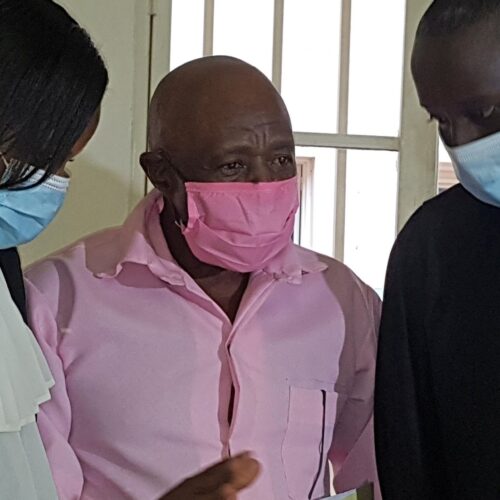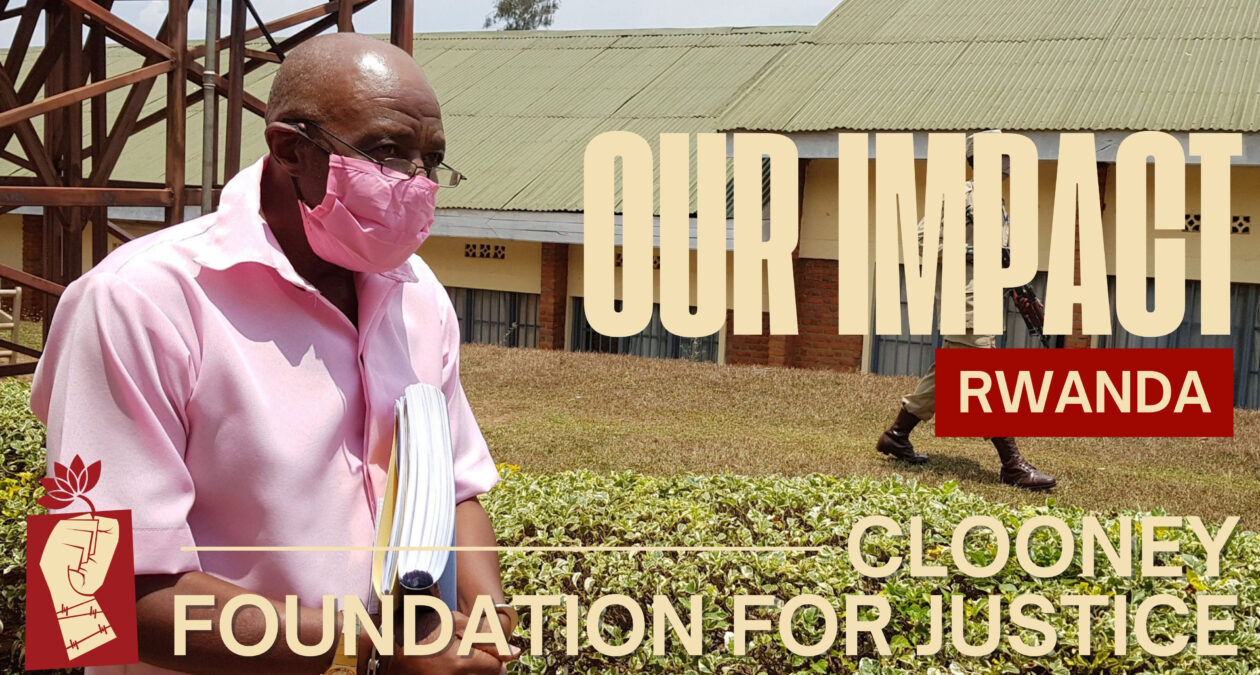Hotel Rwanda Figure Paul Rusesabagina’s Trial ‘Seriously Flawed’ Says TrialWatch Report
This statement can be attributed to the Clooney Foundation for Justice. For further inquiries, please contact [email protected]

The trial of ‘Hotel Rwanda’ figure Paul Rusesabagina “was seriously flawed” and “violated international and regional standards for fair trial procedures,” a TrialWatch report said today. In September 2021 Mr. Rusesabagina was found guilty of forming and funding a group that the prosecution alleged had carried out deadly attacks in Rwanda and was sentenced to 25 years in prison. Today, an appeal court will consider the prosecution’s request to extend his sentence to life in prison, even as Mr. Rusesabagina’s health continues to deteriorate.
“This proceeding smacked of a show trial – the Court fully accepted, and promoted, the government’s case against Paul Rusesabagina, without question or challenge. The verdict of guilty of serious crimes cannot, in consequence, be regarded as beyond reasonable doubt,” said Geoffrey Robertson QC, the Clooney Foundation for Justice’s TrialWatch expert on the case, giving the trial an overall grade of “D”. CFJ’s partner the American Bar Association Center for Human Rights monitored this trial as part of TrialWatch.
Mr. Rusesabagina became a household name for his actions to save lives during the Rwandan genocide, which later became the subject of the Oscar-nominated film, ‘Hotel Rwanda.’
There was a global outcry when Mr. Rusesabagina vanished and reappeared in Rwanda in August 2020, facing a range of terrorism charges—initially without a lawyer. The criminal proceedings that followed were likewise plagued by violations and irregularities. His conviction was based in part on an alleged confession after Mr. Rusesabagina was held incommunicado and without a lawyer. Since the trial’s conclusion, the European Parliament has adopted a resolution condemning the proceedings and calling for Mr. Rusesabagina’s release, and members of the U.S. Congress introduced a resolution urging that he be released.
This report is the third in a series of TrialWatch reports on the case against Mr. Rusesabagina. The first highlighted Mr. Rusesabagina’s lack of access to counsel before trial. The second, authored by Geoffrey Robertson QC and staff at the ABA Center for Human Rights, found numerous violations of Mr. Rusesabagina’s rights before and during the trial. The final TrialWatch report released today concludes that under international and regional standards “the judgment convicting Mr. Rusesabagina should not be relied upon and did not meet the necessary guarantees of fairness.”
“This report is not concerned with Paul Rusesabagina’s guilt or innocence, but whether his trial was fair,” said Mr. Robertson, QC. “The judges properly found that he had been deprived of the facilities necessary to prepare his defense but did not offer him an effective remedy. They did not explore his allegations of mistreatment when arrested, nor after his withdrawal did they probe the motives or the government connections of hostile witnesses. Even before his withdrawal they refused to allow a crucial and controversial witness—a bishop no less—to give sworn testimony or test his statement. These and other defects, detailed in the report, demonstrate that these procedural improprieties, added to the failure to analyse critically the prosecution case, make the conviction questionable.”
TrialWatch’s final report on the case highlights the Court’s unjustified dismissal of concerns about the reliability of pre-trial statements. Specifically, the Court’s judgment relies extensively on statements allegedly made by Mr. Rusesabagina during or immediately following a period when he told the court he was being detained incommunicado, was being denied access to counsel, and was being subjected to mistreatment—in his words being “tied at the legs, face and hands.” Several of Mr. Rusesabagina’s co-defendants gave similar accounts.
One defendant said he had given a statement “because they could torture me under the pretext that I was hiding information.” Another said that he had been tied up as he was interrogated by several people, and that he did not sign documents prepared by the Investigation Bureau because he could not read or write but was told to mark the document with a fingerprint. At trial the Court ignored these issues, despite being obliged under international and regional human rights standards to examine whether incriminating statements were coerced. In Mr. Rusesabagina’s case the Court stated that he had waived his right to counsel, without addressing the key allegations mentioned above.
Statements made by Mr. Rusesabagina and his co-defendants were key to his conviction since the prosecution only presented two witnesses against Mr. Rusesabagina. Neither of these witnesses spoke about charges in the case but instead testified to alleged earlier links to armed groups.
The Court also did not adequately investigate one of the key questions in the case—the relationship between the political coalition with which Mr. Rusesabagina was affiliated called the Mouvement Rwandais pour la Changement Démocratique (“MRCD”) and the armed group that the prosecution alleged carried out the attacks at issue in the case, namely the Front de Libération Nationale (“FLN”). Drawing a link between Mr. Rusesabagina’s role in the political organization and the armed group was integral to the prosecution’s case, and yet the judgment showed “complete acceptance of the prosecution case.” Furthermore, the Court mischaracterized testimony from one of Mr. Rusesabagina’s co-defendants who said that “Rusesabagina says he is not among the founders of FLN.” The judgement instead concluded the co-defendant had testified that Mr. Rusesabagina “is one of the founders of the MRCD coalition and its armed wing FLN.”
For these reasons, the report reiterates that the proceedings were “more public spectacle than judicial undertaking.”
Background:
Mr. Rusesabagina disappeared from Dubai on August 27, 2020. On August 31, 2020, the Rwanda Investigation Bureau announced that Mr. Rusesabagina was in its custody. Upon his arrival in Rwanda, Mr. Rusesabagina was first detained incommunicado and later without access to a lawyer of his choice. In early March 2021, the defense submitted an affidavit from Mr. Rusesabagina to the Court saying that he had been held at an “unknown location” and “tied at the legs, face and hands” upon his arrival in Rwanda.
Mr. Rusesabagina was charged with (1) forming an illegal armed group; (2) being a member of a terrorist group; (3) supporting a terrorist group; and (4) specific crimes as acts of terrorism. The judges visited the prison and decided that Mr. Rusesabagina was not being allowed the time and facilities necessary to prepare his defense, but then they denied his request for further time. As a result, on March 12, 2021, Mr. Rusesabagina withdrew from the proceedings.
The trial lasted from February 17, 2021 until mid-July 2021. On September 20, 2021, the Court convicted Mr. Rusesabagina and sentenced him to twenty-five years in prison.
The final TrialWatch report, released today, analyzes the trial as a whole, as well as the judgment convicting Mr. Rusesabagina. It finds that the proceedings violated Mr. Rusesabagina’s right not to be compelled to testify against himself, his right to counsel, his right to a reasoned judgment, and his right to an independent and impartial tribunal.
It also stresses the findings in an earlier – June 2021 TrialWatch report on the case – that concluded that the Rwandan authorities’ violation of Mr. Rusesabagina’s right to confidential communication with legal counsel, his right to adequate facilities to prepare for trial, and his right to the presumption of innocence “may have irretrievably prejudiced the defense.” That report found that “the fairness of the proceedings appears to have been compromised such as to call into question any verdict convicting Mr. Rusesabagina.”
Violations of Mr. Rusesabagina’s right to confidential communication with his lawyers also took place against the backdrop of allegations that his family was subject to ‘Pegasus’ surveillance by the Rwandan authorities. Following the conclusion of the trial, Mr. Robertson found “This was a show trial, rather than a fair judicial inquiry.”
For a full analysis in English, see here.
For a full analysis in French, see here.
